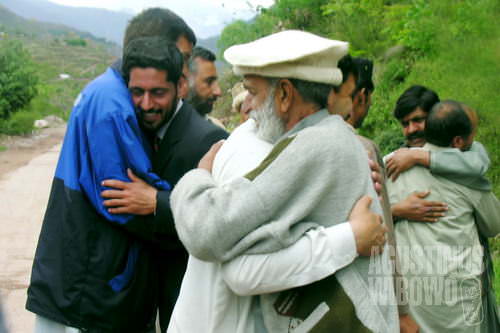Muzaffarabad – Good Bye Noraseri
April 4, 2006

Time to say goodbye
The day to leave Noraseri had come. I had spent quite a month here, and I felt it was already my second home. The people, now I prefer to say, the friends, were so deep in my heart. Farman said that Noraseri had been my second home. He might be right. I would like to return back here to meet again the friends in this village. But now I had to leave to continue the journey.
The farewell was not easy. I had such a limited time, because Rashid from the NGO had called earlier in the morning, saying that I had to return to Muzaffarabad before one, so I may copy the photos of the project. He was leaving to Islamabad and brought the computer back from the office. The office was going to be emptied. And I had to rush.
It was impossible to say farewell to everybody. I started in Doctor Shahab’s house. Together with Junaid and his cousin, Mubasshar, I went to Mubasshar’s house. Mubasshar father was coming a little bit late, after some work in the dispensary. Like Doctor Shahab, Mubasshar family was quite a rich family before the disaster. Mubasshar mother felt me like her died son, as the son had oriental feature. Mubasshar said that her mother was disappointed that I didn’t even spend one night with the family. Mubasshar mother was crying the night before. And today when I said the farewell, she also cried. I felt very sad. I remembered my mother’s tears when I left my hometown for my study in China. The same tears. The motherly tears.
It was in Hajji Shahab house where Samera asked me to take pictures (the family love photos very much) of this sister and that sister. Samera’s husband kept repeating the joke by using the feminine form of verbs when directing me. Hafizah and the bari-amma (big grandmother, the Hajji Shahab’s wife) were working already, not present. Samera invited me to go to another funeral in Barhean. I refused politely.
Vicky, the most beautiful boy in Noraseri (as everybody said) was another famous boy in the village. His father, whom I directed as “Vicky valid”, Vicky’s father (Mr. Azmat, his real name, thought it was too ridiculous to call a man with his son’s name), was a humorous man whom I shared jokes. We were in the same car at that day, sending the bride in the wedding party to the groom’s house. The bride troupe is called as manji. And I was manji. Vicky’s father still used the same word to call me, I was manji. It seemed that I am manji forever. Vicky’s mother, even didn’t talked a lot with me (as the communication between opposite sexes in rural area was quite limited) had heard stories about me from her husband and sons. She told Taj Mahal one day that she liked me. Danny, Vicky’s brother, showed the photos of my mother to her mother (and also to Mubasshar mother who considered me as her oriental son). The two mothers gave same comments. They didn’t believe that the lady in the photo was my mother, they thought it was my sister. In spite of limited communication with Vicky’s mother, I felt her affection. That day when there was no water in Hajji Shahab’s house, it was Vicky’s mother who invited me to use the toilet in her house. And today, when I told them that this farewell might be for a very long period, I saw the same tears as in Mubasshar’s mother’s cheek. The motherly love.
The love from the demolished village of Noraseri, it was the magnet of my gravity.


Leave a comment